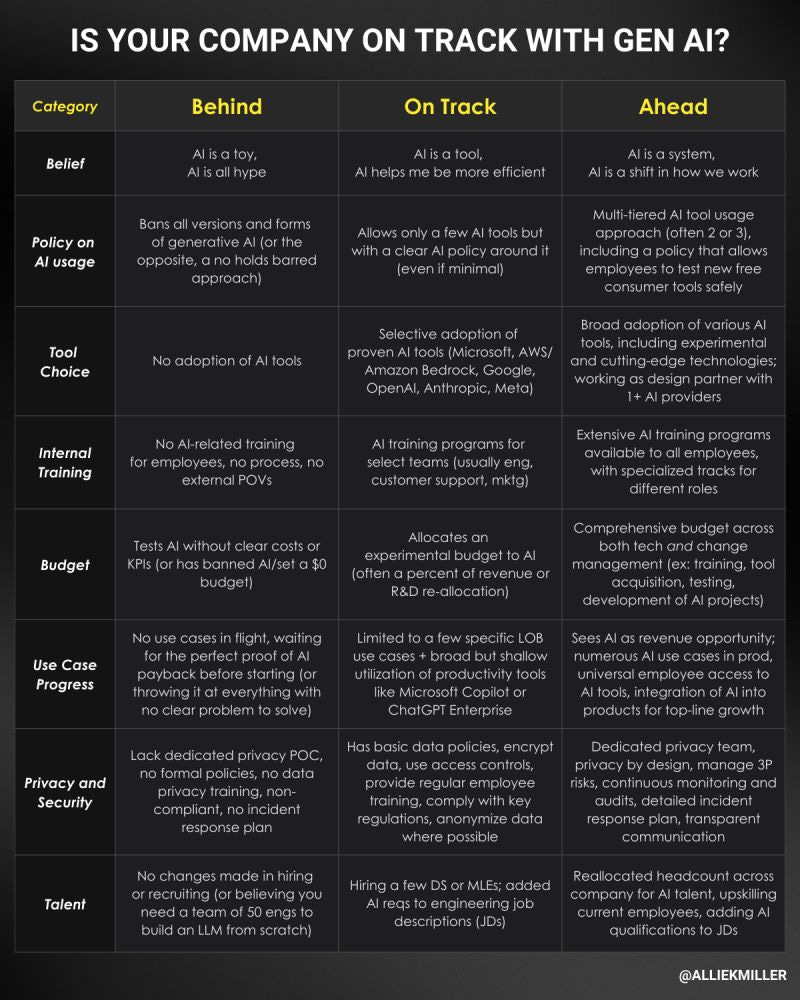Is GenAI Worth it?
Is it worth to try and hammer a nail with an ice pick? Probably not, but maybe you like a challenge? Who am I to judge?

A few weeks ago I commented on a LinkedIn post from Allie Miller that got a lot of attention. I was surprised, contradicting LinkedIn posts about GenAI hype posts is something I do frequently, but something about this one resonated with people. Allie made a post titled, "Is your company on track with AI?" with a chart.
I commented on the post, arguing that such a chart created a sense of FOMO, and ignored the fundamental question: Does your business need AI? I had a lot of responses to my commentary (unfortunately, none from Allie herself), but more than most of my other posts. I thought, "This would make a great article."
It seems like all of my articles lately are inspired by LinkedIn interactions. Inspiration has come from stranger places I suppose. Using my one-sided interaction with Allie as a starting point, I will explore the reports from Goldman Sachs and others and how they all relate to a fundamental question: Is GenAI Worth it?
I characterize a lot of GenAI as a solution looking for a problem, and as a result, it doesn't provide real value. That's why I find LinkedIn posts like Allie's so frustrating -- it relies on creating a sense of FOMO (Fear of Missing Out) for companies that they are somehow 'behind the pack' without saying why. Posts that rely on FOMO make it seem like GenAI is intrinsically valuable. That just using GenAI creates value. It doesn't. GenAI is a tool that works well in some situations and bad a lot of others. It's akin to saying that I can hammer in a nail with an ice pick. I'm sure I could, but why would I? An ice pick doesn't work as well as a hammer. Many use cases of GenAI are trying to hammer a nail with an ice pick.

For GenAI to be worth it, you have to have a use case where AI provides value that you can't derive from other places. GenAI shines in processing a lot of data with low accuracy. Summarizing long documents, like privacy policies or helping security operations teams detect attacks and provide nuanced details about the attacks.
Additionally, there's a growing body of work that says that humans and GenAI paired together and working generate better outcomes, with less bias than either could alone. But that's expensive as the company has to pay for the employee and the AI to gain modest improvement in outcomes. For many companies, the increase in outcomes won't be worth the additional cost.
That's the big takeaway from my article--despite the hype, there are very few current GenAI use cases where GenAI is the best solution.
It's not a surprise that Goldman Sachs says that AI is too expensive and unreliable. It's unfathomably expensive to create, update, and maintain. Outside of a few big names, no companies are close to breaking even. Investors and VCs have been sinking money into anything with the letters "A" and "I" mushed together in hopes of a big payout, swallowing the hype hook, line, and sinker. Now, we are little more than 2 years into this journey as a society, and the misinformation problems are still there and just as problematic as before. Training AI models still costs astronomical amounts of money -- the cost to train models has increased -- with very little value to show for the investment.
Businesses aren't finding the huge productivity gains they were promised. It's telling that a Google search finds very few cases where AI increased business productivity and a lot of articles talking about how GenAI will increase productivity. The hype says the value is there, but the proof isn't in the pudding.
Does your business need GenAI? No, you don't. You might want it, but the chance that it revolutionizes your business is almost-zero because it is not solving a new problem, it is finding dumber ways to do the same old thing and selling you hype.



